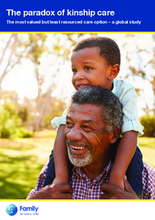Approximately one in ten children around the world live in kinship care. This form of care is both the most widely used and the most valued option for children who cannot be cared for by their parents. Yet it is also neglected by policymakers and practitioners, placing children at great risk.
Kinship caregivers are often expected to look after children with no or minimal support, and greater emphasis is placed by many governments on more formalised forms of care outside of children’s families. The failure to support kinship care exposes already highly vulnerable children to further risk, including mental health problems, poverty, discrimination and exploitation. Family for Every Child explores this critical issue in the new report, The paradox of kinship care.
This report examines the growing use of kinship care, including its value and support needs for safe and effective use. The report argues that there is an urgent need to increase support to children living with relatives or friends of their family, with key recommendations made for national governments, donors and UN agencies.
The paradox of kinship care is based on a review of the literature centring on 40 high, medium and low income countries, and on primary research carried out in five African countries. The full report is available to download in English and Spanish. An executive summary is also available in French, Portuguese, Arabic and Russian.

